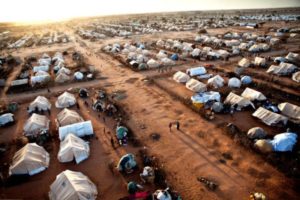Kenya’s expulsion of refugees a catastrophe in the making
The Kenyan government’s announcement that it will attempt to close all of the country’s refugee camps, including the world’s largest at Dadaab, is a move that could displace more than 600,000 vulnerable people.
The questions around what will happen to the inhabitants of these camps, mostly refugees from the brutal and interminable conflicts in Somalia and South Sudan, are almost too horrible to contemplate.
But the realty and logistics of compelling hundreds of thousands of desperate people to return to the war, famine and/or extreme poverty from which they fled is another thing.
 Effectively, the government would be closing down huge and well-established camps – now de facto cities. The largest – Dadaab – would be Kenya’s third largest city, were it to be recognised as such.
Effectively, the government would be closing down huge and well-established camps – now de facto cities. The largest – Dadaab – would be Kenya’s third largest city, were it to be recognised as such.
Who would pay for the removal operation and what is to stop refugees from coming straight back over the border – certainly not the new, poorly and partly constructed border fence with Somalia?
Even as the government ramps up its anti-refugee rhetoric, the population of the camps continues to grow.
One camp, Kakuma, for example, is registering hundreds of new arrivals each week, many of whom are fleeing violence in South Sudan.
To make matters worse, a week before Kenya’s directive, UNHCR-Dadaab announced it would be closing one of the camp’s main hospitals due to funding shortages.
But if it can’t shut them out, the Kenyan government can make life more difficult for the new arrivals. And, in the face of Kenyan hostility, the burden of dealing with these new arrivals will fall to the international community.
Local and international groups have condemned the move and fears have been raised that Somali refugees expelled from Kenya may die trying to cross the Mediterranean.
Medecins Sans Frontieres (MSF) have warned that Kenya’s lack of co-operation and threatened closure would have devastating consequences.
“The closure would risk some 330,000 Somali lives and have extreme humanitarian consequences, forcing people to return to a war-torn country with minimal access to vital medical and humanitarian assistance… MSF is urging the government to reconsider this call,” the organisation said.
Observers say the move, which comes just a week before campaigning begins for next year’s Kenyan presidential election, is a piece of cynical politics by incumbent Kenyan president Uhuru Kenyatta who is seeking a second term.
Like Donald Trump with his comments about Mexican migration to then US or right-wing politicians in Europe captalising on the migration crisis there, Kenyatta sees demonising refugees as an easy way to build political capital with poor and unemployed voters.
Kenyatta has also pushed the theme in the run up to his official campaign that the ongoing war in Somalia has heightened the threat of terror attacks on Kenyan soil.
“Under the circumstances, the government of the Republic of Kenya, having taken into consideration its national security interests, has decided that the hosting of refugees has come to an end,” the government said in a statement on May 6.
In the same statement, the government acknowledged their “decision will have adverse effects on the lives of refugees and therefore the international community must collectively take responsibility on humanitarian needs that will arise out of this action.”
By threatening to shut down the refugee camps, Kenyatta is portraying himself as tough on terror and tough on refugees.
But, perhaps, a glimmer of hope lies in the fact that Kenyatta has said these sorts of things before as an exercise in political posturing and the camps remain.
Kenya’s stance is said to be illegal under international law but as the nation’s notoriously cynical electioneering gets underway, it’s hard to imagine anyone will worry about that.
While refugees in Kenya have the same needs as everyone else, they can’t vote.
Laurie Nowell
AMES Australia Senior Journalist













